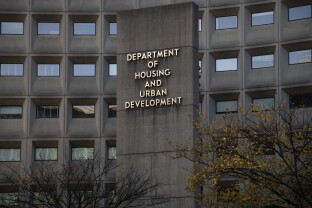Democrats are facing the reality of a quickly changing news cycle and no power in Washington in the new Trump era. It makes bringing attention to individual issues, like housing, much harder.
They acknowledge that, but said they’re exploring the options they do have to try to keep housing issues in the broader discourse: They’re forming caucuses, introducing legislation and trying to partner with nonprofit and constituent groups for events like rallies.
“Democrats can’t do it alone,” Rep. Bonnie Watson Coleman told NOTUS. “We need people out there in the communities to be speaking up on the need for housing and the responsibility of the government to ensure that people are not homeless.”
She wasn’t the only one to point to constituents as being crucial partners in helping keep a focus on housing.
“It’s not hard when you’re back home,” Sen. Elizabeth Warren told NOTUS. “Every town hall includes people asking about housing. We need more housing, and that’s true in Massachusetts and true in every other state in the country.”
Democrats agree the most effective way to highlight housing issues and prove to constituents they are hearing their concerns is by introducing legislation — even if Republicans don’t join them.
“Republicans, they also in their districts, are seeing the housing crisis. Whether they want to address that or not remains to be seen,” Rep. John Garamendi told NOTUS. “But we’ll give them an opportunity to join us.”
Democrats are also launching and reviving congressional groups focused on housing issues. The YIMBY and Public Housing caucuses are new and recruiting members as they try to push for more federal investment in affordable housing and zoning reform. Meanwhile, the congressional Caucus on Homelessness, which had gone largely inactive in the past few years, is getting a reboot from new members who are planning to advocate for funding and legislation aimed at helping the homeless community.
Rep. Suzanne Bonamici, one of the lawmakers taking the lead in bringing back the Caucus on Homelessness, said while it’s only been about two months of the new administration, the shift in priorities can be felt by constituents.
“Highlighting the need is something we really need to do, and telling their stories,” Bonamici told NOTUS, adding that Democrats need to make a point of highlighting any cuts to programs.
The Department of Housing and Urban Development is among the many agencies undergoing drastic changes in the second Trump administration. In his first month as HUD Secretary, Scott Turner halted enforcement of the agency’s Equal Access and Affirmatively Furthering Fair Housing rules and established a DOGE task force. Cuts are expected to hit up to 50% of department-wide staff. It is also reported HUD is in the process of scaling back its local regional offices, leaving many states without any office to administer federal loans or programs.
Rep. Gabe Amo, a member of the House Manufacturing Caucus, a bipartisan caucus focused on the production side of housing, said the rapid changes taking place at HUD’s federal office are causing concern among his constituents.
“Getting [local partners] engaged is another tool for us to put political pressure on Donald Trump,” Amo told NOTUS. “Listen, you can plead with me, but I also want you to go to your national association and tell them.”
Rep. Becca Balint said the lack of available housing is having a direct effect on her district’s economy, and she thinks Democrats’ message should be centered around that.
“We have to continue to point out that nothing that has happened in the last two months has been focused on making the lives of regular people more affordable. We have to continue to hammer that,” Balint told NOTUS. “I think a perfect example is that if you are spending half of your take-home pay on rent or on your mortgage, you don’t feel like you’re getting ahead.”
—
Amelia Benavides-Colón is a NOTUS reporter and an Allbritton Journalism Institute fellow.
Sign in
Log into your free account with your email. Don’t have one?
Check your email for a one-time code.
We sent a 4-digit code to . Enter the pin to confirm your account.
New code will be available in 1:00
Let’s try this again.
We encountered an error with the passcode sent to . Please reenter your email.


